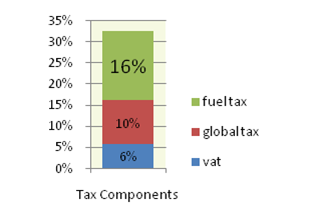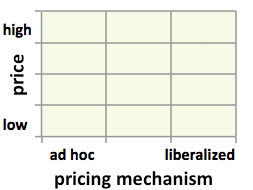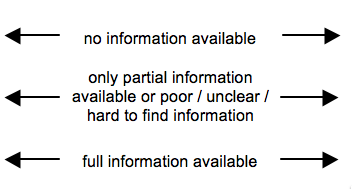Difference between revisions of "Fuel Prices Colombia"
***** (***** | *****) |
***** (***** | *****) m |
||
| (6 intermediate revisions by 2 users not shown) | |||
| Line 1: | Line 1: | ||
{{Fuel Price Factsheet | {{Fuel Price Factsheet | ||
|Fuel Price Country=Colombia | |Fuel Price Country=Colombia | ||
| − | |Fuel Pricing Policies= | + | |Fuel Pricing Policies="Pricing policy: Fuel prices are controlled and price ceilings are set by Ministry of Mines and Energy, subject to the ultimate authority of Superintendency of Industry and Commerce (Superintendencia de Industria y Comercio, SIC), which exercises control over price increases. Price setting is at the discretion of government. A fuel stabilization fund for gasoline and diesel was created at end-2008, the purpose of which was to eliminate fuel price subsidies. An initial deposit of about US$170 million was transferred to the fund at the time. Budgetary transfers for fuel subsidies in 2009 amounted to 4,906 billion pesos (US$2.3 billion). There are no rules governing withdrawals from the fund, as in Chile. By end-2011, the fund’s deficit had grown to 2.2 trillion pesos (US$1.2 billion). ). In Mar 2013, government agreed not to raise diesel prices after a transport strike. |
| − | + | Protests: In Mar 2013, thousands of truckers went on an indefinite strike to protest against rising fuel prices. The strike ended after three days after government agreed to reverse a price increase and not to increase the diesel price for three months. | |
| − | |||
| − | + | Hedging: Although different from hedging petroleum product prices, Ecopetrol, the national oil company, hedges crude oil exports. Hedging cost Ecopetrol US$450 million in 2011, and incurred costs in six out of the past seven years, prompting a congressional hearing in 2012. | |
| − | + | Information: Ministry of Mines and Energy posts detailed price information by location for gasoline and diesel every month, dating back to Jul 2003." | |
| − | + | (Source: Kojima, Masami. (2013, forthcoming). “Petroleum product pricing and complementary policies:Experience of 65 developing countries since 2009.” Washington DC: World Bank.) | |
| − | |||
| − | |||
|Fuel Currency=COP | |Fuel Currency=COP | ||
|Fuel Price Exchange Rate=1850.04 | |Fuel Price Exchange Rate=1850.04 | ||
| Line 31: | Line 28: | ||
{{Fuel Price Factsheet Source | {{Fuel Price Factsheet Source | ||
|Fuel Price Factsheet Source Type=Pump prices and margins | |Fuel Price Factsheet Source Type=Pump prices and margins | ||
| − | |Fuel Price Factsheet Source Link=http:// | + | |Fuel Price Factsheet Source Link=http://bit.ly/1q2OFJ4 |
}} | }} | ||
{{Fuel Price Factsheet Source | {{Fuel Price Factsheet Source | ||
| Line 39: | Line 36: | ||
{{Fuel Price Factsheet Source | {{Fuel Price Factsheet Source | ||
|Fuel Price Factsheet Source Type=Pricing Mechanism | |Fuel Price Factsheet Source Type=Pricing Mechanism | ||
| − | |Fuel Price Factsheet Source Link=http:// | + | |Fuel Price Factsheet Source Link=http://bit.ly/1q2OFJ4 |
}} | }} | ||
{{Fuel Price Factsheet Source | {{Fuel Price Factsheet Source | ||
| Line 61: | Line 58: | ||
|Fuel Price Factsheet Source Annotation=Ministry of Mines and Energy | |Fuel Price Factsheet Source Annotation=Ministry of Mines and Energy | ||
}} | }} | ||
| + | {{Fuel Price Factsheet Source | ||
| + | |Fuel Price Factsheet Source Type=Other Information | ||
| + | |Fuel Price Factsheet Source Link=http://www.dinero.com/opinion/columnistas/articulo/la-encrucijada-del-precio-combustibles/186095 | ||
| + | }} | ||
| + | |||
| + | [[Category:Colombia]] | ||
Latest revision as of 13:57, 7 October 2014
Part of: GIZ International Fuel Price database
Also see: Colombia Energy Situation
Fuel Pricing Policies
| Local Currency: | COP |
| Exchange Rate: | 1850.04
|
| Last Update: |
"Pricing policy: Fuel prices are controlled and price ceilings are set by Ministry of Mines and Energy, subject to the ultimate authority of Superintendency of Industry and Commerce (Superintendencia de Industria y Comercio, SIC), which exercises control over price increases. Price setting is at the discretion of government. A fuel stabilization fund for gasoline and diesel was created at end-2008, the purpose of which was to eliminate fuel price subsidies. An initial deposit of about US$170 million was transferred to the fund at the time. Budgetary transfers for fuel subsidies in 2009 amounted to 4,906 billion pesos (US$2.3 billion). There are no rules governing withdrawals from the fund, as in Chile. By end-2011, the fund’s deficit had grown to 2.2 trillion pesos (US$1.2 billion). ). In Mar 2013, government agreed not to raise diesel prices after a transport strike. Protests: In Mar 2013, thousands of truckers went on an indefinite strike to protest against rising fuel prices. The strike ended after three days after government agreed to reverse a price increase and not to increase the diesel price for three months.
Hedging: Although different from hedging petroleum product prices, Ecopetrol, the national oil company, hedges crude oil exports. Hedging cost Ecopetrol US$450 million in 2011, and incurred costs in six out of the past seven years, prompting a congressional hearing in 2012.
Information: Ministry of Mines and Energy posts detailed price information by location for gasoline and diesel every month, dating back to Jul 2003."
(Source: Kojima, Masami. (2013, forthcoming). “Petroleum product pricing and complementary policies:Experience of 65 developing countries since 2009.” Washington DC: World Bank.)
Fuel Prices and Trends
| Gasoline 95 Octane | Diesel | |
|---|---|---|
| in USD* |
|
|
| in Local Currency |
|
|
* benchmark lines: green=US price; grey=price in Spain; red=price of Crude Oil
Fuel Price Composition
Price composition for one litre of Gasoline 95 Octane as of 2012/04/01.


Source: http://www.ecopetrol.com.co/contenido.aspx?catID=192&conID=36336&pagID=129391
At a Glance
| Regulation-Price-Matrix |
| ||||
 |

|

|

| ||
Sources to the Public
| Type of Information | Web-Link / Source |
|---|---|
| Other Information | http://www.dinero.com/opinion/columnistas/articulo/la-encrucijada-del-precio-combustibles/186095 |
| Other Information | http://www.bamep.gov.co (Bank of the Republic of Colombia) |
| Other Information | http://www.creg.gov.co (Energy and Gas Regulatory Commission) |
| Other Information | http://www.ecopetrol.com (Colombian Petroleum Company) |
| Other Information | http://www.minminas.gov.co (Ministry of Mines and Energy) |
| Pricing Mechanism | http://bit.ly/1q2OFJ4 |
| Pump prices and margins | http://www.ecopetrol.com.co/contenido.aspx?catID=192&conID=36336&pagID=129391 |
| Pump prices and margins | http://bit.ly/1q2OFJ4 |
| Wholesale Prices | http://www.ecopetrol.com.co/contenido.aspx?catID=192&conID=36336&pagID=129391 |
Contact
Please find more information on GIZ International Fuel Price Database and http://www.giz.de/fuelprices
The following coordinate was not recognized: {{#geocode: Colombia|google }}.



















